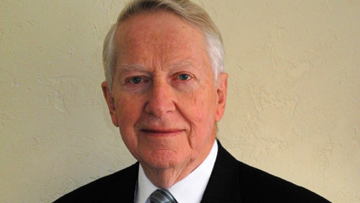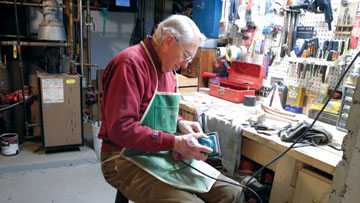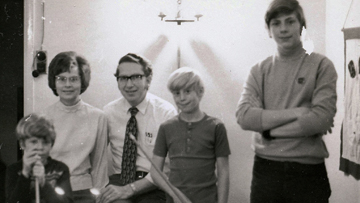What are some of your favorite hobbies or leisure activities and why?
My wife, Floy, and I have enjoyed Scrabble for 57 years. I enjoy the game of golf and the outdoor walk it provides. I like to restore things with woodworking. I have built model airplanes, two boats, and restored a 1960 Thompson Runabout.
I grew up in a musical family. I enjoy singing, as well as playing classical guitar. My first quartet experience was on board ship singing to 2,000 Marines! At Geneva College I was in the CovieChords group and the Genevans choir.
What is one of the funniest things that ever happened to you?
While a senior at Geneva, 30 of us went to Westminster College to “decorate” their campus for the coming homecoming game with Geneva. Two of the six cars were caught. We were parceled out in twos to the frat houses. The first thing they did was cut our hair. I sported a white (scalp showing) “W” on the top of my head. It took a while to grow back, but through it I learned how to cut hair. It was all in good fun.
What does your daily devotional life look like? Is there anything you would do to improve it?
I meet with the Lord in the morning right after breakfast. It involves reading the Word and, often, particular studies, e.g., at the moment I’m studying Jesus’ calls to the gospel. I read a section from Psalm 119 to begin, then from a book of the Bible’s wisdom literature, then an Old Testament section and a New Testament section. I include Scripture memory review as part of my worship experience, and do about 25–30 portions per day. I have a good bit of variety this way, but my goal is fellowship with Jesus. I follow that with personal prayer, including a list of men for whom I pray, 8 per day. Floy and I also meet to sing, read, and pray, especially for our family and friends around the world. My time with Jesus is flexible; I walk with Him, which provides all kinds of variations, but it’s never dull. I don’t ask the question of how could I improve it. He leads me. I seek to follow.
How did discipleship become central in your life?
The Lord answered my prayers in seminary, seeking from God what I was missing. I didn’t know. Later, when I heard Dawson Trotman talking about care of the new believer and the story of how the men to whom he ministered multiplied, I knew why the RP Church had been a declining church. We did not know how to train up believers to become reproducers. I gave myself to learn all I could about that. It did not require any change in doctrine, but it did bring to me the doctrine of union with Christ, which provides the dynamic of the Christian life. I have no recollection of hearing about that doctrine in seminary—which could be my fault—but that doctrine has motivated and excited me to see the power of the Holy Spirit unleashed! It still excites me (Gal. 2:20). It then followed that anyone could, upon coming to Christ, become a strong, robust disciple, ready to reach and teach others (2 Tim. 2:2).
Why is something that is so obvious also so important for you to emphasize to believers?
It may not be so obvious to believers in the first place. It is generally passed over without much comment. Secondly, according to what I have learned from other theologians (Schaeffer, Murray, Pink, etc.), the fact that all believers died in Christ and rose in Him is true. That’s just the way it is. However, the “experimental” aspect of that doctrine, or may I say “experiential,” is not necessarily communicated just by making clear the doctrine. For example, Paul in Ephesians 1:15ff, writing to those whom he calls elect, prays that they would come to know—that’s existential, not cerebral—the “hope, riches, and power” that were theirs in Christ. And he does the same in Ephesians 3:14ff. He’s praying these Christians will come to know (experience) the love of Christ. Reformed people are timid about going into the experiential of the Christian life, but according to Murray, that is where the dynamic of the biblical ethic rests. The “assurance of the indicative (I died with Christ and rose) underlies the imperative; and the assurance of the indicative provides the dynamic of the biblical ethic.” He goes on to say that, unless one is motivated by that union with Christ, it’s not the biblical ethic.
The Lord taught me these things from the practical to the theoretic, not the other way around. When I began to realize Jesus was meeting with me as I read, studied, and memorized the Word, I became excited. I now knew experientially how to fellowship with Him in the Word and prayer. So I began to experience these things, then later went back to examine theologically what had happened to me. How I thank God for His grace in showing me these things! They underlie my whole concept of the Christian life and ministry.
For many people, being hospitable in a sustained way is very difficult. What are some keys to being hospitable for the long term?
Floy and I both came from big families (7 kids, 6 kids), so we were used to lots of people around. We were also trained by the Navigators in how the home can be used for hospitality. Both of us shared a liking for an ordered schedule for meals and family worship. Floy did not work out of the home; she saw homemaking as her calling. Over the years, we enjoyed having many, many “live-ins” wanting to learn about the Christian home functionally. As the boys grew, we included them in the decision to have someone live in our home or not. Let me add that, for the most part, we had Christian live-ins. Hospitality was just our way of life.
You and Floy provided hospitality to Dr. Rosaria Butterfield even when she was an enemy of Christ, and then as a new Christian. In the beginning, were you also proactive in seeking her out?
Let it be understood that my approach to Rosaria originally was to go “through her” to the university students. When we invited her to dinner, it was not to reach her. But it was during that first dinner, as we got to know her a bit, we learned from her, as she admitted, “I am not really sure I know what I believe.” Lights went on. I still pressed her to let me present my overview of the Bible to her students so they’d at least know what it says, but she was reluctant. However, it was then she said, “If you are not concerned about having a class of one, I would be glad to hear it.” Thus, as we got to know her, trust on both sides developed.
How does one develop a passion for the lost spanning many decades?
I am not exactly sure what you mean by “spanning many decades,” but the answer to the first part comes from our fellowship with Jesus. One must recognize the dynamic of true fellowship with Jesus. How can one “follow Him daily” and not have a passion for the lost? “The love of Christ constrains us…” (literally, “puts us under pressure”). In a way it sounds like Peter: “I’m going fishing.” However—and here’s where union with Christ is so vital—when I cultivate my walk with Him, then He gives the fruit.
For two years when I was in seminary I preached vigorously—and truly—but with no known fruit (converts, believers). Once I began to get my own life sorted out in terms of cultivating my union with Christ, He began to give me fruit. (Here, of course, many people try to duck the inference of fruit as people. But when one understands the relation of Jesus to His Church, then the bride brings forth children, to His glory.) I think this is the crux of the matter: Union with Christ helped me understand that I was not to win people to Him, but He would use me to draw people to Him. Big difference! So, I happily walked with Him and He gave me people who wanted help. And as I taught them to walk with Christ (Col. 2:6-7) they learned how to help others do the same.
Retirement doesn’t seem to exist for Reformed Presbyterian ministers. Is that a good or bad thing?
I resigned (notice the term, not retired) from the active pastorate after having served 50 years. I did that because I did not want to fall into that posture where the congregation feels for this old pastor and is sort of “carrying him” along. I wanted to finish strong. So I don’t know that there’s a rule. I would not pose one. It can be good. as I think it was in my case, but it could be detrimental if the man was beyond his prime. By the way, I believe the church’s retirement plan has helped many pastors be able to retire…plus Social Security.
What has retirement been like for you?
Very busy. However, remember that I control my own schedule; and because Floy and I have heretofore been in very good health, we were available for all kinds of assignments. It has been a very good experience.
What are some mistakes you’ve made?
Probably that question would be more easily answered by my colleagues who have known me over the years. I have tried not to look back and second-guess some of my decisions—calls that I have turned down. Did I make a mistake? I don’t ask that.
Early in my ministry at Central Pittsburgh, two of our godly elders asked me for an appointment. We met. They said, “We don’t think you’re aware of this, but many in the congregation are feeling that you are driving them instead of leading them.” I was floored! But how I appreciated their coming to me! I immediately corrected my posture before the congregation.
I lived with LeRoy Eims—or he with me—for two years. One time Dave Carson stopped by the parsonage and asked if he could wash his own car. He was taking it to a dealer to sell it. I, of course, told him yes, explaining where the hose was, etc. After he’d left, LeRoy said to me, “Where I came from, when someone came along like that, we would have dropped what we were doing and pitched in and helped him.” It was a good rebuke. And because I have had such persons around me—including my wife—I’ve avoided many pitfalls.
You and Floy wrote a book called Learning to Be a Family. If you were writing that book today, would you emphasize anything differently?
Probably not. I would just provide an update on some of the cultural problems, but that book was written with fundamentals in mind.
Your marriage has been a strong one. What would you say are keys to a fruitful and lasting covenant marriage?
Marry the right partner. A man should have a sense of call on his life so she can be his helper. This results in biblical teamwork; but the household knows why they are where they are. It’s dad’s calling. So from that the kids learn from home as a launching pad how to pursue God’s call. In a sense, then, God’s call on the father becomes the call on the family at this time. The wife may hold a job, too, but normally it should fit in with his calling so there is one call, one purpose, for that family’s being where it is.
Dad, take the leadership, especially in family worship. If you don’t know how, learn how. And spend time with your kids. Get to know them. Listen to them. Share your life story and stories with them. And above all, spend good time with your wife. (This is all written from “his” point of view. But she’s to be the same—sharing her life with the kids.)
What aspects of the Reformed Presbyterian Church have been the greatest blessings to you? What do you see as the greatest challenges facing the RP Church?
The greatest blessing is that, through this branch of the church, I heard the gospel of Jesus. He’s our great legacy! And with our focus on Him, we can associate with all kinds of people and church branches who follow the same Jesus. So, I like both our distinct history and legacy, and I like our commitment (Cov. of 1871) to a biblical ecumenism.
I’m not sure what is the greatest challenge, but I like to read the book of Jude warning about the infiltrators of that day. The same is true today. The greatest threat is from other branches of the church seeking to undermine the truth. We in the West will probably incur some rather severe opposition and threat, especially if we’re faithful to our theology of the kingship of Christ. Our biggest challenge is to find “faithful men who will be able to teach others also.” If we’ve got the faithful men, we can meet any and every challenge.



